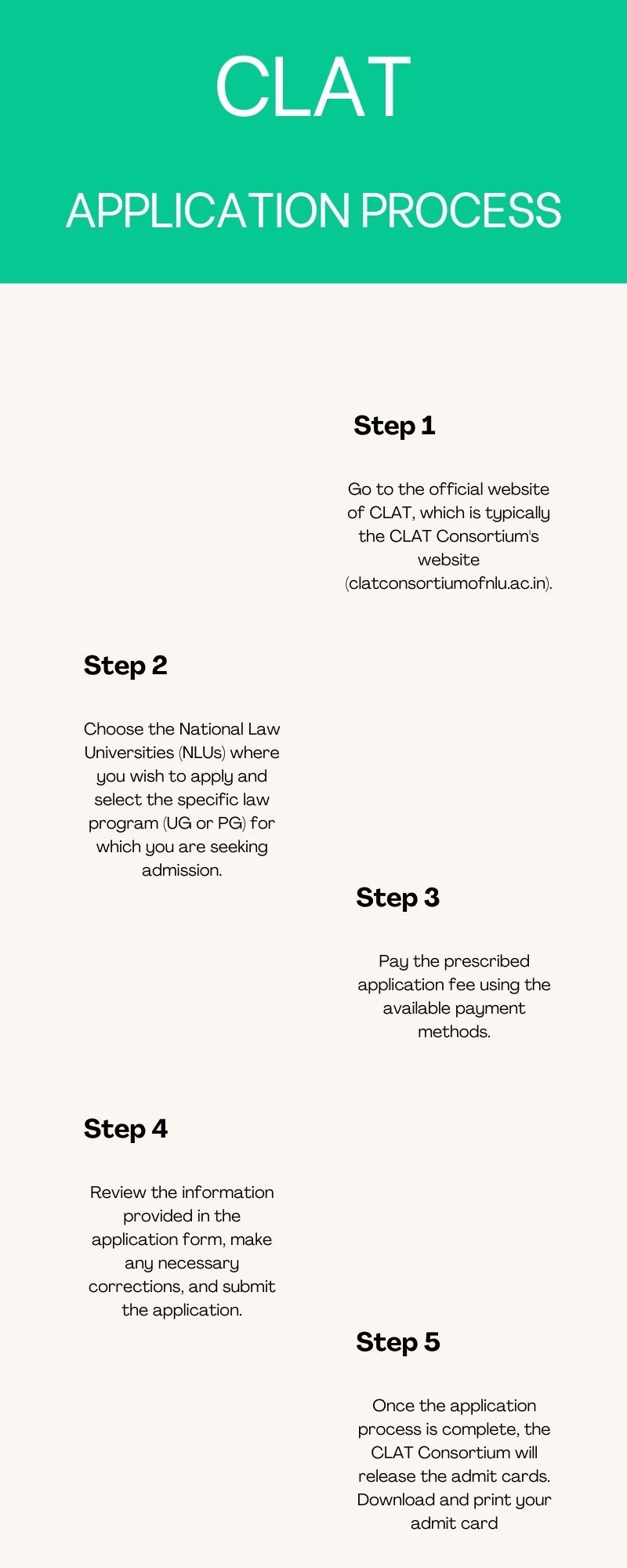Common Law Admission Test
CLAT Highlights
| Exam Specifics | Details |
|---|---|
| Exam Name | Common Law Admission Test |
| Conducting Body | The Consortium of National Law Universities (NLUs) |
| Exam Level | Graduation & Postgraduation |
| Mode of Exam | Offline |
| Exam Duration | Two hours |
| Exam Frequency | Once a year |
| Exam Helpline | 08047162020 |
| Exam website | https://clatconsortiumofnlu.ac.in/ |
CLAT Overview
The Common Law Admission Test (CLAT) is a uniform entrance test driven by India for admission to UG and PG law schools provided by eligible institutions like NLUs and other participating institutions. The CLAT was set up with the aim of standardizing the selection procedure and giving a chance to each and every applicant so that they may join this noble profession of law. The CLAT serves as a gateway or a window for aspirants looking to get into the legal system.
CLAT, one of the most prestigious law exams in India, measures candidates on various parameters such as their competency in English, general knowledge, current affairs, legal reasoning, and analytical reasoning. The format of the examination is usually Maurice of MCQs, where applicants have to choose the right option in between the given options. Besides that, the CLAT may also contain sections examining a candidate's understanding and critical analysis, both of which are very important to any legal career.
A crucial aspect of CLAT is its wide coverage across the country, as applicants not just from just one area but from anywhere in the nation can participate in the competition for the limited seats in the NLUs in India. Such a scenario, hence, comprises diversity, in which there is plurality in law schools, as well as competitiveness, which is suitable for academic success and complete development.
NLUs and other members of the CLAT consortium are in charge of the processes, such as conducting and arranging a test. The governing body is in charge of selecting the exam syllabus, facilitation of examination paper production, examination coordination, and announcement of the results. Furthermore, it guarantees consistency and fairness in the admissions process by following the steering norms and standards established.
The combined efforts of the rigorous study time and the day-to-day practice are extremely important because the fighting is hard and the syllabus is wide. Most aspirant students frequent coaching institutions, practice on their own, and use the questions from the precious years' papers as their source of studying. Also, being knowledgeable about current events and legal issues is very important as you get to the height of the test.
CLAT Eligibility
Eligibility criteria for the Common Law Admission Test (CLAT) are an essential aspect to consider for aspiring candidates seeking admission into undergraduate and postgraduate law programs at various premier law universities in India.
To be eligible for CLAT, candidates must meet certain requirements.
Educational Qualifications for UG Programs :
- Candidates should have completed or should be appearing in the final examination of the 10+2 system or its equivalent with a minimum aggregate score.
- The minimum aggregate score requirement may vary between NLUs, but it is usually around 45% to 50% for general category candidates. There may be relaxation in aggregate marks for candidates belonging to reserved categories such as SC, ST, OBC, and PWD.
Age Limit :
- There is often no maximum age restriction for participating in the CLAT examination for undergraduate programs.
Educational Qualifications for PG Programs :
- Candidates should have completed or should be appearing in the final year examination of their undergraduate degree in law or an equivalent qualification.
- The minimum qualifying marks for PG programs may vary between NLUs, but it is typically around 50% for general category candidates and lower for reserved category candidates.
Nationality :
- Candidates should be Indian nationals or meet specific nationality requirements as specified by the participating NLUs.
Foreign Nationals and NRI Candidates :
- Some NLUs may have specific provisions for foreign nationals and Non-Resident Indians (NRIs) to apply for CLAT.
- They may have to fulfill additional eligibility criteria as prescribed by the respective NLUs.
Other Requirements :
- Candidates are required to fulfill any other eligibility criteria specified by the participating NLUs, such as qualifying marks in the qualifying examination, documentation requirements, etc.
Summary
CLAT Exam Pattern
Common Law Admission Test ( CLAT ) exam pattern for both the Undergraduate (UG) and Postgraduate (PG) programs:
CLAT UG Exam Pattern:
The CLAT UG exam is designed to assess candidates for admission to undergraduate law programs. The exam consists of multiple-choice questions (MCQs) across five key sections:
-
English Language: This section evaluates candidates' proficiency in English, including comprehension passages, grammar, and vocabulary. It typically comprises 28-32 questions.
-
General Knowledge & Current Affairs: Candidates' awareness of current events, general knowledge, and contemporary affairs is tested in this section. The number of questions ranges from 35-39.
-
Legal Reasoning: This section assesses candidates' ability to understand legal principles, draw inferences, and apply reasoning skills. It usually consists of 35-39 questions.
-
Logical Reasoning: Logical reasoning questions evaluate candidates' analytical and logical thinking abilities. The section includes 28-32 questions.
-
Quantitative Techniques: Elementary Mathematics questions assess candidates' basic numerical and mathematical skills. This section typically contains 13-17 questions.
| Section | Number of Questions | Marks per Question | Total Marks |
|---|---|---|---|
| English Language | 28-32 | 1 | 28-32 |
| General Knowledge & Current Affairs | 35-39 | 1 | 35-39 |
| Legal Reasoning | 35-39 | 1 | 35-39 |
| Logical Reasoning | 28-32 | 1 | 28-32 |
| Quantitative Techniques | 13-17 | 1 | 13-17 |
| Negative Marking | 0.25 marks deducted for each wrong answer. No negative marking for unattempted questions. |
CLAT PG Exam Pattern:
The CLAT PG exam is aimed at candidates seeking admission to postgraduate law programs. The exam structure for CLAT PG includes the following:
-
Constitutional Law: This section comprises 40 questions and assesses candidates' knowledge of constitutional principles, landmark judgments, and legal concepts.
-
Jurisprudence: With 50 questions, this section examines candidates' understanding of legal theories and philosophies.
-
Other Law Subjects: Covering various legal subjects, this section consists of 50 questions and evaluates candidates' knowledge in areas beyond constitutional law and jurisprudence.
| Section | Number of Questions | Marks per Question | Total Marks |
|---|---|---|---|
| Constitutional Law | 40 | 1 | 40 |
| Jurisprudence | 50 | 1 | 50 |
| Other Law Subjects | 50 | 1 | 50 |
| Negative Marking | 0.25 marks deducted for each wrong answer. No negative marking for unattempted questions. |
Summary
CLAT Application Process
The application process for the Common Law Admission Test (CLAT) typically involves several steps, including registration, filling out the application form, uploading documents, paying the application fee, and downloading the admit card.
The application process for the Common Law Admission Test ( CLAT ) is a crucial step for aspiring law students.
Visit the Official Website:
- Go to the official website of CLAT, which is typically the CLAT Consortium's website (clatconsortiumofnlu.ac.in).
Register Online:
- Create an account by registering online on the official CLAT website.
- Provide the required details such as your name, email address, and mobile number.
Fill in the Application Form:
- Log in to your account and fill in the online application form.
- Provide personal details, academic qualifications, and other necessary information.
Upload Documents:
- Upload scanned copies of your photograph, signature, and any other required documents as per the specifications mentioned in the application form.
Select NLUs and Program:
- Choose the National Law Universities (NLUs) where you wish to apply and select the specific law program (UG or PG) for which you are seeking admission.
Pay the Application Fee:
- Pay the prescribed application fee using the available payment methods.
- The fee amount may vary based on the category of the candidate.
Submit the Application:
- Review the information provided in the application form, make any necessary corrections, and submit the application.
Download Admit Card:
- Once the application process is complete, the CLAT Consortium will release the admit cards.
- Download and print your admit card, as it is essential for appearing in the CLAT.
Appear for CLAT:
- On the scheduled date and time, appear for the CLAT examination at the designated exam center with the printed admit card and a valid photo ID.
Check Results:
- The CLAT results are usually announced on the official website. Check your results using the provided credentials.
Candidates should reach the exam center well in advance of the specified date, carrying the admit card, ID proof, and any other required documents. In conclusion, the CLAT application process is a comprehensive and meticulous procedure that requires candidates to provide accurate details, follow instructions diligently, and stay updated with all examination-related information.

Summary
Common Law Admission Test Faqs
Who is in charge of conducting CLAT?
How often is CLAT held?
What are all the available ways to take CLAT?
Where can I find detailed information about CLAT?
How can I get support or answers to my questions about CLAT?
Get Easy Insights Into the World of Entrance Exams
Share this Exam
Popular Exams
- All India Bar Examination
- Andhra Pradesh Post Graduate Law Common Entrance Test
- Law School Admission Test India
- Symbiosis Law Admission Test
- Narsee Monjee Institute of Management Studies Law Aptitude Test (NMIMS LAT)
- Rajasthan University LLB Entrance Test
- Maharashtra Common Entrance Test for Law
- Executive Management Aptitude Test
- National Council for Hotel Management & Catering Technology Joint Entrance Exam (NCHMCT JEE)
- Amrita Entrance Examination– Behavioural Sciences
- Karnavati University Aptitude Test
- Lucknow University Associated Colleges Management Admission Test
- GITAM Admission Test
- Under Graduate Admission Test
- DU JAT (scrapped)
- Joint Integrated Programme in Management Admission Test
- State Eligibility Test
- Jindal Scholastic Aptitude Test
- UPES Management Entrance Test- Under Graduation
- Integrated Programme in Management Aptitude Test
Recommended Exams
Read More about the Popular exam
TSLAWCET
The Telangana State Law Common Entrance Test (TS LAWCET) plays a vital role for those who plan to enroll in courses of undergraduate and postgraduate programs in law and intend to pursue academic pursuits in Telangana, India. The Telangana State Council of Higher Education (TSCHE), owned and operated by Osmania University, is the competent body to conduct the Telangana TS LAWCET every year to choose from the students who attend and successfully pass the test.
TS LAWCET examines students' capability in different areas, including general knowledge, reasoning and analytical skills, law affairs, and aptitude in the legal field. The exam is usually based on multiple-choice questions, or MCQs, which are specifically designed to assess individuals on their logical thinking, critical reasoning, and problem-solving abilities, which are paramount aspects of becoming a legal professional.
The examination is done individually for both undergraduates in the program of 3-year LLB and postgraduates in LLM. Those wishing to obtain a degree of LLB (3-year) are required to complete their bachelor's degree in a university recognized by the law, and all those who seek their education from a recognized institution with a degree in law (LLB) can join the LLM program.
During preparation for TS LAWCET, we must know the pattern of the exam, the syllabus of the subject we are studying and the previous year's papers properly. The candidates should concentrate on developing their strong legal thinking, reading, and legislative compilation skills. The repeated implementation of mock tests and regular practice sessions can contribute to the increase in the shuttles’ readiness for the candidates and, as a result, they will be improving their skills in time management.
After the TS LAWCET test has been successfully passed, students are eligible to fill out a form for admission to all the good law colleges and universities in the state of Telangana that provide law courses at the undergraduate and postgraduate levels. The counseling is carried out by TSCHE, which is characterized by document verification, seat allocation, and counseling sessions through which candidates get the chance to acquire seats considering their merit performance and choices.
Read More
APLAWCET
The Andhra Pradesh Law Common Entrance Test ( AP LAWCET ) is a highly sought-after examination for aspiring law students in the state of Andhra Pradesh, India.
Organized by Sri Krishnadevaraya University, Anantapur on behalf of the Andhra Pradesh State Council of Higher Education (APSCHE), this entrance test serves as a gateway for candidates looking to secure admissions into various law courses offered by renowned universities and colleges in Andhra Pradesh.
AP LAWCET is conducted annually and assesses the candidates' aptitude in three main areas – general knowledge and mental ability, current affairs, and aptitude for the study of law.
This comprehensive examination tests candidates' knowledge and understanding of legal principles, as well as their analytical and logical reasoning abilities.
The test is available in English as well as Telugu, and its duration is 90 minutes.
It consists of multiple-choice questions, and the candidates' performance in AP LAWCET determines their eligibility for popular courses such as 3-year LLB, 5-year integrated LLB, and postgraduate law programs.
AP LAWCET is a highly competitive examination, and candidates need to prepare thoroughly by studying various legal concepts, staying updated with current affairs, and practicing previous years' question papers.
Successful candidates in AP LAWCET gain entry into prestigious institutions, paving their way towards a successful career in the field of law.
With its robust evaluation process and comprehensive syllabus, AP LAWCET has established itself as a reliable and credible examination, meeting the aspirations of countless law aspirants in Andhra Pradesh.
Read More
AILET
AILET, or All India Law Entrance Test, is one of the most admired and challenging tests for law aspirants who want to get admission to the prestigious National Law University (NLU), Delhi. It is a highly competitive contest where the candidates are tested on aptitude for both undergraduate and postgraduate programs in law. The NLU Delhi-run AILET not only appeals to candidates' aspirations but also to their hope of pursuing a career in law.
AILET conducts examinations to evaluate the skills of the candidates, including, nevertheless, English language speaking, reasoning ability, legal aptitude, general knowledge, and affairs knowledge. The test usually has MCQs, and sometimes there are additional essay-type questions in order to evaluate candidates ability to think analytically, reason critically, and solve problems. These three things are vital in the legal field for a successful career.
In undergraduate (BA LLB), postgraduate (LLM), and PhD programs, the three components of the examination are conducted indifferently. Candidates who seek admission to BA LLB should have already passed the 10th Board Examinations or equivalent, while students seeking admission to the LLM program must possess a bachelor’s degree in law (LLB) from a recognized university. For Ph. E. programs, only those candidates able to fulfill the admission requirements set by NLU Delhi shall be admitted.
In regard to the AILET preparation process, one should familiarize themselves well with the exam structure, material's course, and questions from the past years. Among legal experts, it is a well-known fact that strategic knowledge and necessary skills that are needed for law students are improvements in legal thinking, understanding, and general law knowledge. Conducting mock tests, attempting tens of exam papers, and writing essay practice can assist applicants a lot in getting acquainted with the test structure and raising their score.
Successful AILET students head to NLU Delhi to study law in its programmes. The NLU Delhi system of counseling handles the verification of documents, the allocation of seats, and the counseling sessions in which candidates are placed in order of their merit ranking as well as their preferences.
Read More
TS PGLCET
The Telangana State Post Graduate Law Common Entrance Test ( TS PGLCET ) is a state-level entrance exam conducted by Osmania University on behalf of the Telangana State Council of Higher Education (TSCHE).
This entrance test serves as a gateway for aspiring students to pursue postgraduate law programs (LLM) in various law colleges and universities within the state of Telangana.
The exam aims to evaluate the candidates' knowledge, understanding, and aptitude in the field of law.
The TS PGLCET is held once a year, typically in the month of May, and follows a computer-based online mode of examination.
Aspirants seeking admission to the LLM program must fulfill the eligibility criteria set by the university, which includes having a bachelor's degree in law from a recognized institution with a minimum aggregate score of 50%.
The entrance test consists of objective-type questions that cover various subjects such as Jurisprudence, Constitutional Law, Public International Law, Mercantile Law, Labour Law, and more.
The duration of the exam is 90 minutes, and the question paper is available in both English and Telugu languages.
The selection process is based on the candidates' performance in the entrance test, and qualified candidates are then called for the counseling session, where they can choose their preferred college and specialization based on their rank and availability of seats.
The TS PGLCET provides a valuable opportunity for law aspirants to pursue higher education and enhance their career prospects in the field of law within the state of Telangana.
Read More
KLEE
The KLEE (Kerala Law Entrance Exam) will become the seminal hallmark for those who seek to study a law undergraduate course or a law masters degree within the state of Kerala. This exam, which is under the control of the Commissioner of Entrance Examinations (CEE), Kerala, unquestionably serves as a gateway to law schools and colleges spread out across the state. The fact that the KLEE is widely acclaimed because of its strict evaluation and due compliance with the rules of law is an ample illustration of the commitment of Kerala to raising good lawyers and ensuring the right standards in the institution of law.
KLEE bridges the legal multi-discipline gap by providing in-depth coverage of a wide array of topics that are relevant to aspiring law practitioners from various backgrounds, both academically and professionally. Besides undergraduate courses, e.g., the integrated LLB course of 5 years, it also caters to postgraduate courses, e.g., the LLM (Master of Laws), providing students with the opportunity to be in the legal field after completing their high school education. The syllabus for KLEE essentially evaluates candidates' capabilities, knowledge, and analytical competencies in different areas that include legal reasoning, constitutional law, criminal law, civil law, and so many other specializations as well.
The KLEE preparations need strong dedication and self-discipline, along with meticulousness and the planning of a strategy, while confronting numerous challenges. In addition to classroom instruction, applicants might participate in extensive preparation courses involving the use of textbooks, reference materials, and electronic resources that strengthen the knowledge base around legal ideas and theories.
The KLEE exam is a challenging test with its hard questions and limited time, making it necessary to have the ability to strategically manage the time, filter out the questions, and display calm under pressure. The KLEE victory for students does not only mean gaining admission to well-known law colleges; it also implies getting specialized training and career advancement opportunities, which can be the first steps in becoming a true professional and making a meaningful contribution to the legal industry.
Read More
CollegeBharat Help
Do you need additional help?

Get Support
Log in for Personalized service and assistance.

CollegeBharat Community
CollegeBharat Community is here to help.

Get in touch with our
expert counsellors
By continuing, you are confirming your agreement to CollegeBharat's Terms & Conditions and Privacy Policy.



